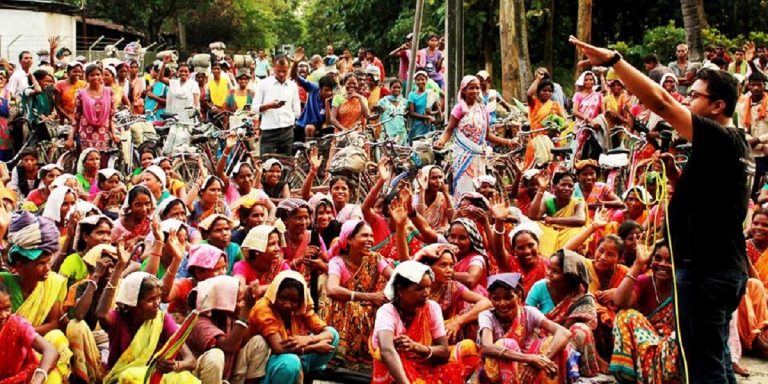
A charity in New Delhi is building India’s first online database of human trafficking cases in a bid to plug a massive information gap and help law enforcers clean up the epicentre of the modern slave trade.
India is home to more slaves than any other country in the world, yet a lack of crime data is hindering efforts to understand the organised networks that are buying, selling and exploiting women and children for personal profit.
Activists hope the online record might be a game changer.
“This is important as it comes at a time when the government is framing new legislation on human trafficking and there is a lot of conversation about tackling the crime,” said Ravi Kant, founder of anti-trafficking charity Shakti Vahini.

Now, traders are turning to technology sell and exploit women and children. Pic: Reuters/Cathal McNaughton
Kant is partnering with Texas Christian University (TCU) to replicate the technology its academics and software engineers used to create a database of U.S. trafficking prosecutions.
As slave traders turn ever more to technology to further their business, Kant says it is time to play them at their own game and digitise data so it can be used to better effect.
“After inputting details from court records into the database, we will for the first time be able to analyse everything from the profile of traffickers, their modus operandi and the types of trafficking, to the quality of police investigations and the quantum of sentences being handed down,” Kant told the Thomson Reuters Foundation.
From the data, researchers will be able to identify trends nationwide, said Kant, such as identifying states with fewer prosecutions and making the case for increased funds and training for police, prosecutors and judges.

Texas Christian University. Pic: Shutterstock,
There are an estimated 46 million people enslaved worldwide, with more than 18 million of them living in India, according to the 2016 Global Slavery Index by the Walk Free Foundation.
Many are villagers lured by traffickers with the promise of a good job and money up front, only to find themselves or their children forced into work as domestic help, agricultural labourers or prostitutes.
Almost 20,000 women and children were the victims of human trafficking in India in 2016, a rise of nearly 25 percent from the previous year, according to government data.
LAWYER, FIGHTER
That rise is not lost on Kant.
A supreme court lawyer and human rights activist, Kant has spent about two decades fighting for the rights of women and children who have been trafficked and enslaved.
Together with his two brothers, Kant works with police to locate and rescue the missing. Their charity also campaigns for strong anti-trafficking policies and laws.
While there have been some wins and losses in their efforts to influence legislation, Kant says the one constant that has been desperately lacking all these years is data.
“We know what the challenges are in tackling trafficking in India and we also know what the possible solutions are,” Kant said. “The problem is that no one is willing to listen if you don’t have the numbers to back it up.”
Ravi Kant form Shakti Vahini, said they hoped to replicate the caravan in India's northeastern states https://t.co/tPKhLk3x3f #FundFreedom
— Blossom Media Arts (@blossomediarts) May 24, 2017
Named as a “Global Innovator” by TCU in March, Kant is now working with the university‘s political science department, which recently developed a database of more than 900 trafficking cases prosecuted in the U.S. federal courts.
Kant and a team of researchers are now replicating this for India, scouring records from more than 600 district courts to find trafficking cases then logging all the data they find.
By the end of the year, they hope to have details of about 4,000 cases dating back to 2000, which they will then use to identify trends and patterns.
“We know it’s a Herculean task, but it is possible. Most court records are digitised and are in English and we hope to work with law students to build the database,” he said.
“We see how traffickers are increasingly using technology to lure, buy and sell victims, so we feel we also have to do the same and use technology to stop them.”
Liked this? Then you’ll love these…
India’s student startup founders get opportunity to pitch to Silicon Valley players
India: Disney-esque app BYJU’S hungry to take over online learning







